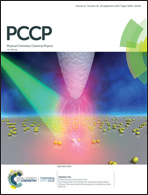CO2 reutilization for methane production via a catalytic process promoted by hydrides†
Abstract
CO2 emissions have been continuously increasing during the last half of the century with a relevant impact on the planet and are the main contributor to the greenhouse effect and global warming. The development of new technologies to mitigate these emissions poses a challenge. Herein, the recycling of CO2 to produce CH4 selectively by using Mg2FeH6 and Mg2NiH4 complex hydrides as dual conversion promoters and hydrogen sources has been demonstrated. Magnesium-based metal hydrides containing Fe and Ni catalyzed the hydrogenation of CO2 and their total conversion was obtained at 400 °C after 5 h and 10 h, respectively. The complete hydrogenation of CO2 depended on the complex hydride, H2 : CO2 mol ratio, and experimental conditions: temperature and time. For both hydrides, the activation of CO2 on the metal surface and its subsequent capture resulted in the formation of MgO. Investigations on the Mg2FeH6–CO2 system indicated that the main process occurs via the reversed water–gas shift reaction (WGSR), followed by the methanation of CO in the presence of steam. In contrast, the reduction of CO2 by the Mg-based hydride in the Mg2NiH4–CO2 system has a strong contribution to the global process. Complex metal hydrides are promising dual promoter-hydrogen sources for CO2 recycling and conversion into valuable fuels such as CH4.

- This article is part of the themed collections: Celebrating Latin American Talent in Chemistry and 2019 PCCP HOT Articles


 Please wait while we load your content...
Please wait while we load your content...